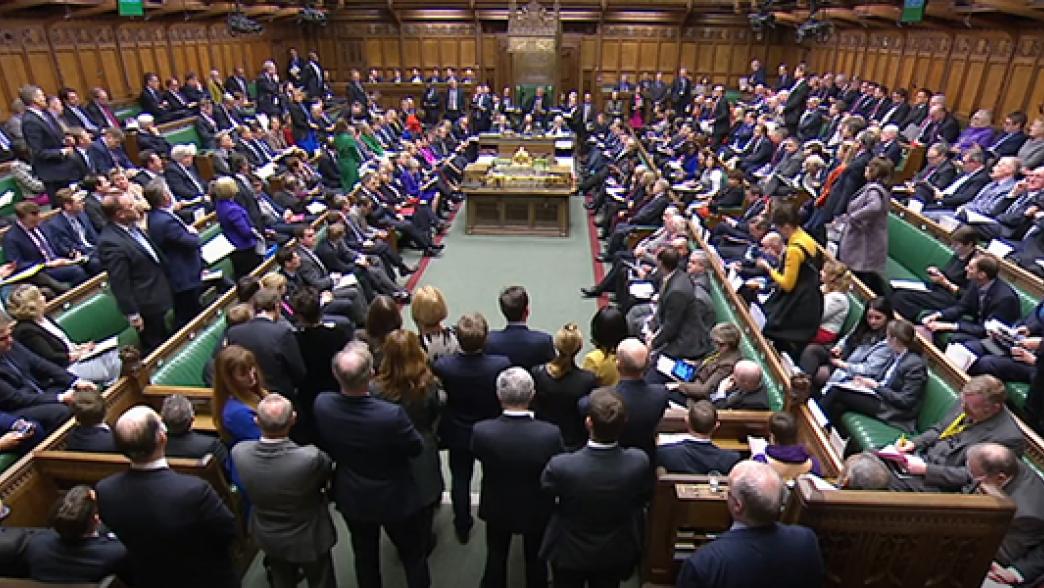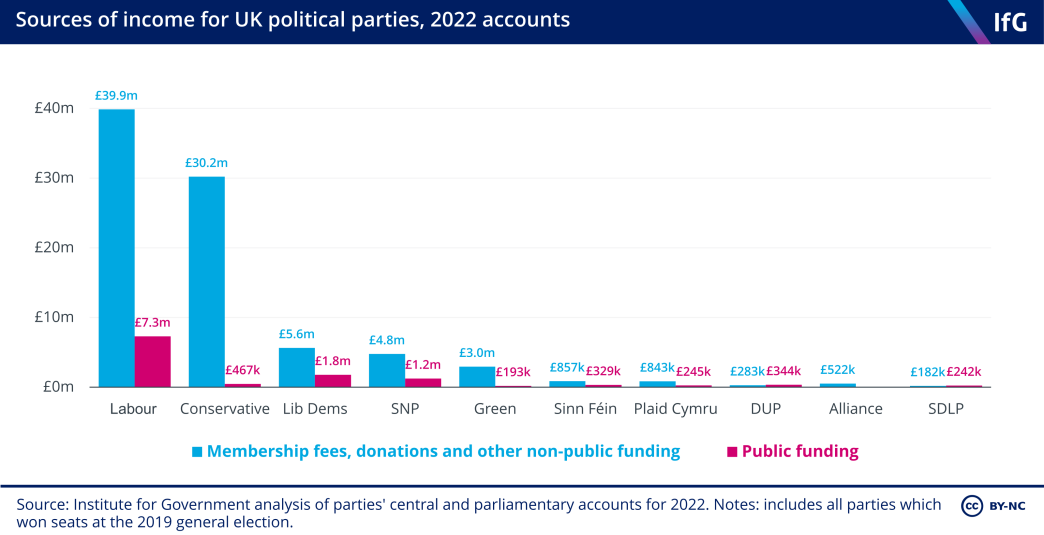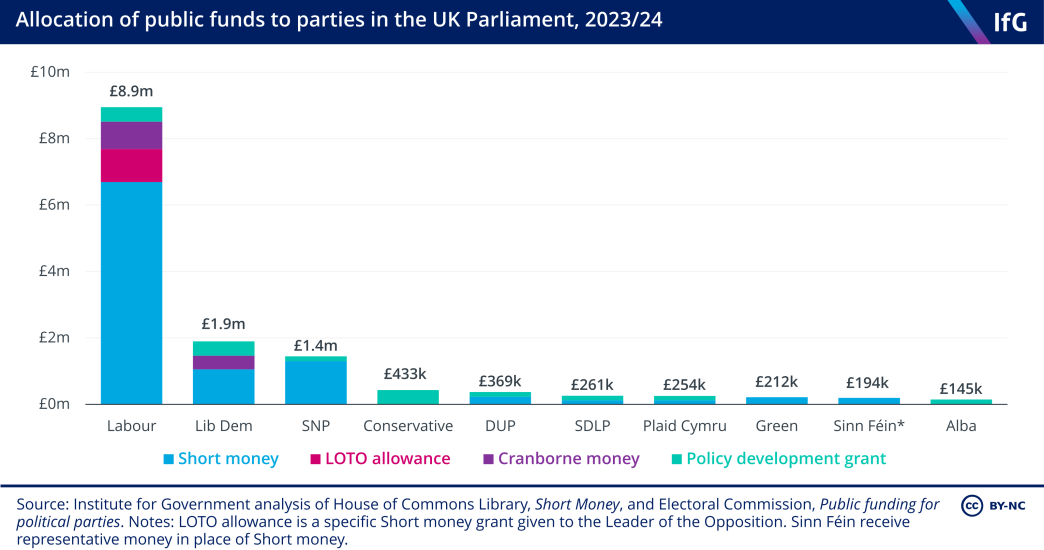Rules for funding for political parties
How much funding do political parties receive?

How are political parties in Westminster funded?
Most political parties receive the bulk of their funding through membership fees and donations from individuals, companies and trade unions.
Nonetheless, many parties also receive significant amounts of public funding. This funding is particularly important for opposition parties, which must formulate policy without the support of the civil service, and small political parties, which often receive a lower level of private funding.
How much funding do political parties receive?
During the 2022 calendar year, the Labour Party reported a total of £39.9m in income from membership fees, donations and other private funding sources, 14 The Labour Party, Financial statements for the year ended 31 December 2022, 7 July 2023, search.electoralcommission.org.uk/Api/Accounts/Documents/25317 while the Conservative Party received £30.2m 15 The Conservative Central Office, Financial statements for the year ended 31 December 2022, 5 July 2023, search.electoralcommission.org.uk/Api/Accounts/Documents/25352 and the Liberal Democrats £5.6m. 16 Liberal Democrats, Annual report for the year ended 31 December 2022, 4 July 2023, search.electoralcommission.org.uk/Api/Accounts/Documents/25320; Parliamentary Office of the Liberal Democrats, Annual report year ended 31 December 2022, 4 July 2023, search.electoralcommission.org.uk/Api/Accounts/Documents/25323 These amounts were all much larger than the total public funding they received.

What are the rules on party donations?
There are no limits on how much can be donated to a political party or to individual politicians.
Donations and loans to parties must be from a ‘permissible source’. In Great Britain, only individuals on a UK electoral register can make donations. UK-registered companies, and some UK-registered organisations (like trade unions) are also permissible sources. In Northern Ireland, ‘permissible sources’ also include Irish citizens and Irish-registered companies.
Political parties are responsible for checking the source of loans and donations over the value of £500 to ensure they come from permissible sources. They must return donations and loans if they are uncertain of the identity of the donor or lender.
Can non-UK citizens and companies donate to political parties?
Foreign companies and individuals who are not on the UK electoral register cannot make political donations. The only exception is for overseas visits. Foreign organisations and individuals can pay for ‘reasonable costs’ of an overseas visit for politicians.
What are the requirements for reporting donations?
Political parties and politicians must record details of loans and donations. Donations or loans over £7,500 to the central party must be reported to the Electoral Commission. Party sections whose finances aren’t managed by the central party must report donations over £1,500.
MPs must report loans and donations over £500 made in connection with their activities as an MP to the parliamentary commissioner for standards.
Political parties and MPs must also report any impermissible loans and donations that they return to the donor to the Electoral Commission and the parliamentary commissioner for standards, respectively.
What are the different kinds of public funds available to political parties?
The main source of public funding for political parties is ‘Short Money’, named after the Labour MP Edward Short, a minister in the Wilson government. It was introduced in 1975 to support opposition parties carry out parliamentary business, including policy research.
Parties primarily use Short Money to cover the salaries of researchers in their central offices. In 1993, additional funds were made available to cover travel expenses, and then again to cover the cost of running the office of the leader of the opposition in 1999.
Short Money is available to opposition parties that have won either two seats in the House of Commons at the previous general election, or one seat and more than 150,000 votes in total from all seats contested. Independent MPs – those without a party affiliation – are not eligible for any public funds.
Parties that cross the two-member threshold as a result of a by-election or a defection from another party mid-way through a parliamentary session are not eligible for Short Money. This means that if MPs break away to form a new political party between elections, as happened during the 2017–19 parliament, that party is not eligible for public funding.
Short Money is also not available to Sinn Féin, the Irish republican party, because its members do not take an oath of allegiance to the Crown (or take their seats in Westminster). Since 2006, ‘Representative Money’, an analogous scheme to Short Money, calculated using a similar funding formula, has been paid to the party.
Parties in government do not receive Short Money. When the Liberal Democrats went into coalition with the Conservative Party in 2010, they no longer qualified for Short Money and were forced to reduce their central office research staff. The Democratic Unionist Party continued to receive Short Money in the 2017–19 session after it concluded a confidence and supply agreement with the Conservative Party, as it did not formally join the government.
Cranborne Money, introduced in 1996, provides funds to support the main opposition party in the House of Lords (currently Labour), the second-largest opposition party (the Liberal Democrats) and cross-bench peers.
Policy development grants, introduced in 2000, are awarded to parties to help them develop policies to include in election manifestos. The grants are available to all parties in the House of Commons with two or more MPs (who have taken the oath). They are administered by the Electoral Commission.
How are the funds allocated to political parties?
The formulas used to distribute public funds vary according to the individual schemes.
Short Money is allocated to parties based on a combination of the number of seats won at the last general election and the number of votes they received. In 2023/24, parties will receive just under £21,500 per seat won plus £42.82 for every 200 votes they received in 2019. An additional Short Money travel fund is distributed in the same proportions as the general funding scheme. Parties with five MPs or fewer cannot receive more than £354,255 in Short Money (150% of the staffing budget of a non-London MP) nor less than £118,085 (50% of the staffing budget).
There is a separate allowance for the Leader of the Opposition’s office running costs – for 2023/24 this is just under £1m. 19 House of Commons Library, Short Money, 8 June 2023, commonslibrary.parliament.uk/research-briefings/sn01663/
The Electoral Commission is allowed to distribute £2m in policy development grants each year. Half of this amount is distributed equally between eligible parties. The other half is distributed using a formula that takes into account the vote share the party received in each constituent nation of the UK and the proportion of the registered electorate where the party contests elections. 20 Electoral Commission, Public funding for political parties, www.electoralcommission.org.uk/who-we-are-and-what-we-do/financial-reporting/donations-and-loans/public-funding-political-parties
How much public funding do parties receive?

- Political party
- Conservative Labour Liberal Democrat Sinn Féin
- Publisher
- Institute for Government